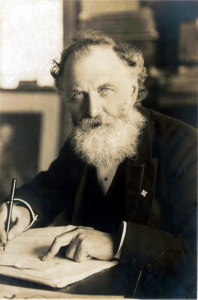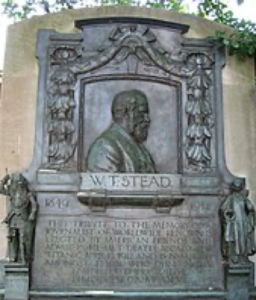Meet the most famous passenger aboard Titanic
Arguably the most esteemed passenger on the Titanic and one of the characters in my book Sheltering Angel: A Novel Based on a True Story of the Titanic was William Thomas Stead.
According to the W.T. St ead website, he was “a newspaper revolutionary and one of the most controversial figures of his age.” Newsman, pacifist and spiritualist, Stead was “an important contributor to the evolution of today’s popular journalism.” A pioneer of investigative journalism in Britain during the Victorian era, Stead’s work exemplified how the press influenced public opinion and political policy by what he called “government by journalism.”
ead website, he was “a newspaper revolutionary and one of the most controversial figures of his age.” Newsman, pacifist and spiritualist, Stead was “an important contributor to the evolution of today’s popular journalism.” A pioneer of investigative journalism in Britain during the Victorian era, Stead’s work exemplified how the press influenced public opinion and political policy by what he called “government by journalism.”
Born in Northumberland, England, in 1849 and tutored by his mother, by the age five Stead was able to read Latin almost as well as he could read English. At age 22, he became the youngest newspaper editor in England when he took the helm of The Northern Echo. Two years later he married his childhood sweetheart, Emma Lucy Wilson, the daughter of a local merchant. Over the years, Emma bore him six children.
Always guided by a moral mission, Stead considered his editorial position “a glorious opportunity of attacking the devil.” A political activist in her own right, his mother led a local campaign against the government’s controversial Contagious Diseases Act requiring prostitutes to undergo medical examinations. Stead joined the campaign against the act, and his influence succeeded in having the law repealed.
In 1880 he became assistant editor of the liberal Pall Mall Gazette, which eventually became the London Evening Standard. From being a benign chronicle of the day’s events, Stead transformed the Gazette into an innovative and daring voice, initiating and supporting political and social movements. With the forceful and fervent demeanor of his father, a congregational minister, Stead campaigned for truth and justice throughout his career.
When the Gazette’s editor John Morley was elected to Parliament, Stead became editor and Morley avowed that if he could manage Stead, he could manage anything.
Over the years Stead developed what Matthew Arnold called “The New Journalism.” Stead’s shocking stories of squalid life in the slums resulted in the Royal Commission recommending that the government clear the slums and build low-cost housing in their place. It was Stead’s first journalistic success.
He became known for his vigorous handling of public affairs and the brilliantly modern way he presented the news. Not only did Stead report the news, but he created it, as his most famous series about Eliza Armstrong demonstrated. Eliza, a 13-year-old chimney sweep’s daughter, was farmed into prostitution and “purchased” by Stead in 1885 to prove how easily one could procure sexual favors from a minor. The articles were a war waged on Victorian prostitution and Stead’s crusade to raise the age of sexual consent from thirteen to sixteen.
Before the stories about the young prostitute appeared in print, Stead published a caveat to “all those who are squeamish, and all those who are prudish, and all those who prefer to live in a fool’s paradise of imaginary innocence and purity, selfishly oblivious to the horrible realities which torment those whose lives are passed in the London Inferno, will do well” not to read the Pall Mall Gazette for the next few days. Nevertheless, copies of the paper sold out. The success of his campaign resulted in what became known as The Stead Act.
The articles were said to have inspired George Bernard Shaw to write Pygmalion, the story of Professor Henry Higgins who takes Eliza, a young guttersnipe, and turns her into an elegant woman fit for royalty. Even so, because Stead had not been given permission from the girl’s father for her “purchase,” he was convicted on technical grounds and spent three months in prison.
By 1912, at age 63, Stead boarded the Titanic in first class to take part in a peace congress to be held at New York’s Carnegie Hall at the request of President Taft. By now his beard had turned gray, but his piercing blue eyes still glimmered with the intensity of his earlier years. During much of the voyage, he worked on his speech in his cabin but joined other passengers for dinner.
Stead had become fascinated with spiritualism and claimed to receive messages from the afterlife. During an eleven-course repast, he spoke with other Titanic passengers about the cursed mummy of the British Museum who supposedly inflicted ill will on anyone who laid eyes on it. Stead not only had visited the mummy but had been turned down in his request to hold a séance in the room where the mummy was placed. He also predicted his own death either by drowning or lynching.
After the ship struck the iceberg, Stead helped several women and children into lifeboats and gave his life jacket to another passenger. It was as if he knew his hour had come. After Titanic sank, Stead’s body was never recovered.
Stead has been hailed as the greatest newspaperman of his age. He was believed to have been nominated for a Nobel prize. His friend Viscount Milner eulogized Stead as “a ruthless fighter who had always believed himself to be on the side of angels.”
According to his biographer W. Sydney Robinson, Stead “twisted facts, invented stories, lied, betrayed confidences, but always with a genuine desire to reform the world – and himself.” According to British historian Dominic Sandbrook, “Stead’s papers forced his readers to confront the seedy underbelly of their own civilization” and “held up a mirror to Victorian society.”
 In 1920 a memorial bronze was erected to Stead in New York’s Central Park. It reads, “W. T. Stead 1849–1912. This tribute to the memory of a journalist of worldwide renown is erected by American friends and admirers. He met death aboard the Titanic April 15, 1912, and is numbered amongst those who, dying nobly, enabled others to live.”
In 1920 a memorial bronze was erected to Stead in New York’s Central Park. It reads, “W. T. Stead 1849–1912. This tribute to the memory of a journalist of worldwide renown is erected by American friends and admirers. He met death aboard the Titanic April 15, 1912, and is numbered amongst those who, dying nobly, enabled others to live.”
The novel Sheltering Angel is available from online booksellers or may be ordered through local bookstores or the publisher Black Rose Writing.
Sounds like a guy we could use right now.
You said it, man. I’d like a satire about what he’d say about DJT.
Fascinating account of a remarkable man. Looking forward to reading Sheltering Angel.
I have never heard of Stead until I met him in this account. Sounds like he was fearless as an editor and as a writer. Remarkable life.